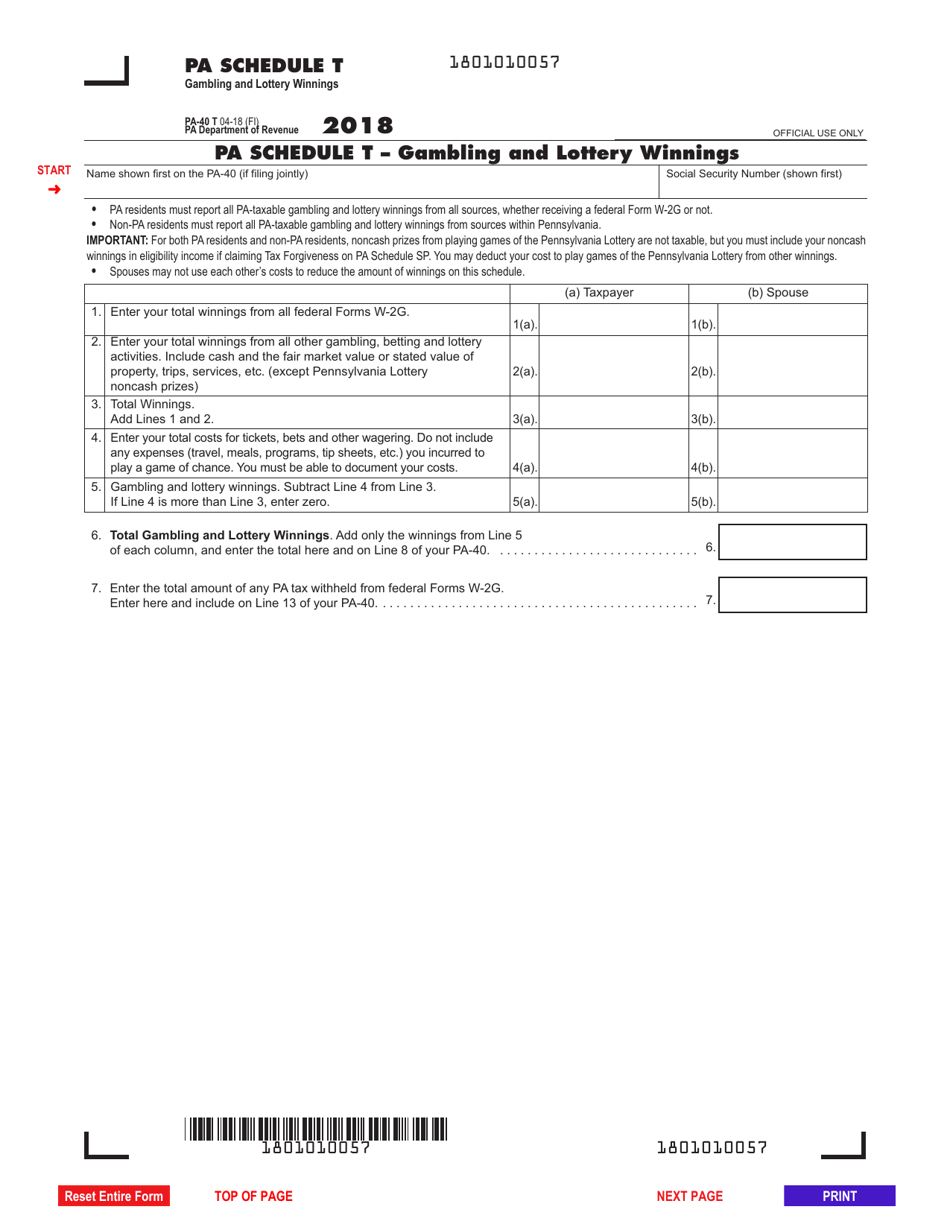Does Pa Tax Gambling Winnings
Another Month, Another Sports Bet Record in NJ: $931M in Nov
When it comes to sports betting taxes, the state of Pennsylvania belongs to those with a higher percentage. In other words, if you want to claim ceratin winnings from betting in PA you will have to pay a 24% gambling winnings tax to the government. Not paying tax on bet winnings is illegal. Does Pa Tax Gambling Winnings Pai Gow Card Game Best Real Money Poker Apps For Ipad Promo Code For Big Fish Casino Slots Uefa Cup 1994 Casino Salzburg Sugar Rush Game.
New Jersey gamblers wagered more than $931 million on sports in November, the latest in a string of monthly records set by a rapidly growing market that's closing in on the $1 billion-a-month mark.
Hard Rock Casino Goes Digital
Hard Rock International (HRI), a global leader in hospitality and entertainment, today announced the launch of Hard Rock Digital as part of its ongoing commitment to innovation and diversification of its portfolio in high-growth markets. Hard Rock Digital is a joint venture with gaming industry veterans, and will be the exclusive Hard Rock and Seminole Gaming (SGA) vehicle for interactive gaming and sports betting, globally.
Ayre Offers His Online Gambling, Crypto Predictions for 2021 as Bitcoin Price Skyrockets
Internet entrepreneur and billionaire Calvin Ayre took a moment to sit down and offer his predictions for the online gambling and crypto space as we are about to enter 2021 and depart from what few would argue against was the worst year ever. Well, maybe not for Bitcoin. That digital currency was sitting just below its all time high at $19250 as this was going to press.
GOP Mega Donor, Casino Billionaire Sheldon Adelson Pushes for Casinos in Texas
Texas currently has just one casino that only offers electronic gaming machines
Tennis Line Judge Rocher Banned for Betting on Matches
Tennis line judge David Rocher was banned for 18 months on Wednesday, with four months suspended, for betting on matches.
We think it's important for you to understand how we make money. It's pretty simple, actually. The offers for financial products you see on our platform come from companies who pay us. The money we make helps us give you access to free credit scores and reports and helps us create our other great tools and educational materials.
Compensation may factor into how and where products appear on our platform (and in what order). But since we generally make money when you find an offer you like and get, we try to show you offers we think are a good match for you. That's why we provide features like your Approval Odds and savings estimates.
Of course, the offers on our platform don't represent all financial products out there, but our goal is to show you as many great options as we can.
This article was fact-checked by our editors and reviewed by Christina Taylor, MBA, senior manager of tax operations for Credit Karma Tax®.
Betting on sports is part of the fun for many sports fans — even if their wagering hasn’t always been technically legal.
Until a May 2018 U.S. Supreme Court decision opened the door for every state to legalize sports betting, just four states allowed wagering on sports — Nevada, Delaware, Montana and Oregon. Legality, however, hasn’t stopped Americans from betting on sports. In fact, the American Gaming Association estimates that Americans spend more than $150 billion a year on illegal sports betting.
Since the Supreme Court’s ruling, New Jersey, Pennsylvania, West Virginia, Mississippi and Rhode Island have legalized sports betting. And at least 14 other states are considering laws to permit wagering on sports.
Does Pa Tax Gambling Winnings Losses
But when you gamble on sports, it won’t matter to the IRS if your winnings came from a legal bet or from one that’s off the books. Your winnings are taxable income either way.
If you plan to do some wagering in a state that’s legalized sports betting, it’s important to understand how tax on your winnings will work. Let’s take a look at how the IRS treats gambling winnings of any kind.
Sports-betting winnings are taxable income
The big question for sports gamblers: Are your winnings taxable income? As we said above, the answer is yes.
“Gambling winnings are fully taxable and you must report the income on your tax return,” the IRS says. “Gambling income includes but isn’t limited to winnings from lotteries, raffles, horse races and casinos. It includes cash winnings and the fair market value of prizes, such as cars and trips.”
Although sports betting isn’t one of the examples, it’s still covered by “gambling winnings.”
Whether sports betting is legal in the state where you place your bet doesn’t matter to the IRS. If you win, you have taxable income, which should be reported when you file your tax return.
These rules apply only to casual sports bettors. If you’re a pro — “in the trade or business of gambling,” as the IRS puts it — different rules apply.
How much tax you’ll owe depends on your personal tax situation and tax bracket.
You might also owe state income tax on any money you win from betting on sports, depending on which state you live in. For example, Nevada doesn’t have a state income tax. But Maryland does, and it considers winnings from gambling taxable income. If you win money betting on sports, check with your state to see if it taxes gambling winnings.
What types of income are taxable?Form W-2G: Evidence of your sports-betting win
So you win a couple thousand bucks betting on your favorite sports team. How will the IRS know if you don’t tell it? Well, whomever you won the money from — a casino, racetrack, etc. — is supposed to report your winnings to the IRS on Form W-2G. The form tells the IRS some important information, including …
- Contact information for the payer who awarded you the winnings, including phone number, address and federal tax identification number
- Your name, address and taxpayer identification number
- How much you won
- When you won it
- What kind of wager you made
- And how much, if any, federal and state income tax the payer withheld from your winnings
Generally, the payer has to report your winnings if …
- You won $1,200 or more from a bingo game or slot machine
- You raked in $1,500 or more at keno
- Your poker victory tops $5,000
- You won $600 or more and your winnings are at least 300 times the amount of your bet (bingo, slots, keno and poker are exceptions to this rule)
- The payor withheld federal income tax on the winnings
Penalties for not reporting sports-betting income
Of course, the IRS wants you to report all your taxable income, and if you don’t you could face penalties and interest on any tax you owed but didn’t pay.
Generally, the penalty for not paying income tax that you owe is 0.5% of the unpaid tax. That rate is assessed monthly until you pay the tax you owe. Unpaid tax and penalties typically accrue interest, too — 5% compounded daily from the due date of your tax return to the date when you actually pay in full the balance of any tax, penalties and interest you owe.
However, if you’re caught intentionally omitting income — like gambling winnings — from your tax return in order to avoid paying tax on that income, it could mean additional penalties. According to the tax code, trying to “evade or defeat” tax you owe on income you’re required to report could be a felony with fines of up to $100,000 for individuals or five years in prison. Plus, people convicted of tax evasion can be held responsible for the costs of prosecution.
What should you do if you can't pay your taxes?
Lose a sports bet? It might be deductible!
Just as sports-betting winnings are considered taxable income, losses may be tax-deductible if …
- You itemize your deductions
- You keep detailed records of your winnings and losses
“To deduct your losses, you must keep an accurate diary or similar record of your gambling winnings and losses and be able to provide receipts, tickets, statements or other records that show the amount of both your winnings and losses,” the IRS says.
Any losses you deduct cannot exceed winnings that you report when you file your return. For example, if you reported winnings of $5,000, you could deduct losses only up to that amount. Additional losses would not be deductible. And if you lost $5,000 but didn’t win anything, you wouldn’t be able to deduct those losses at all.

If you’re eligible to deduct your sports-betting losses — or any other gambling losses — you’ll do so on Schedule A, Line 28, “Other Miscellaneous Deductions.”
Bottom line
More than a quarter of Americans like to bet on football, 21% are interested in betting on baseball or basketball, and 20% would put some money down on a hockey game, according to Nielsen Sports. If you’re a fan of sports wagering, it’s important to understand that tax on sports betting is nothing new.
The IRS has always considered gambling winnings taxable income, and it expects you to report all your taxable income — even the money you win betting on sports.
If you’ll be reporting gambling winnings on your federal income tax return, or hoping to write off some gambling losses, be sure to keep detailed records of your wagers and losses.
Christina Taylor is senior manager of tax operations for Credit Karma Tax®. She has more than a dozen years of experience in tax, accounting and business operations. Christina founded her own accounting consultancy and managed it for more than six years. She co-developed an online DIY tax-preparation product, serving as chief operating officer for seven years. She is the current treasurer of the National Association of Computerized Tax Processors and holds a bachelor’s in business administration/accounting from Baker College and an MBA from Meredith College. You can find her on LinkedIn.
Does Pa Tax Gambling Winnings Tax
